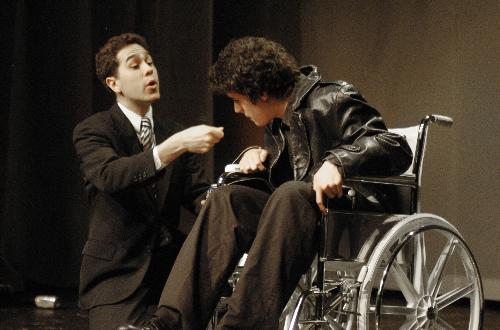
News
Cambridge Residents Slam Council Proposal to Delay Bike Lane Construction

News
‘Gender-Affirming Slay Fest’: Harvard College QSA Hosts Annual Queer Prom

News
‘Not Being Nerds’: Harvard Students Dance to Tinashe at Yardfest

News
Wrongful Death Trial Against CAMHS Employee Over 2015 Student Suicide To Begin Tuesday

News
Cornel West, Harvard Affiliates Call for University to Divest from ‘Israeli Apartheid’ at Rally
Reconsidering 'Richard II'

It’s a rare moment when an English professor, a tennis player, and a garbage collector can find a common interest. Yet all three may find themselves intrigued by the production of William Shakespeare’s “Richard II” going up in the Loeb Ex this weekend. Directed by Adam G. Zalisk ’07 and produced by Veronica T. Golin ’07 and Jason M. Lazarcheck ’08, this new adaptation of the classic history play seeks to reinvigorate the Elizabethan text with modern influences as disparate as tennis great John McEnroe and the detritus of a collegiate Saturday night.
The play, which recounts the disintegration of King Richard II’s reign and Henry Bolingbroke’s subsequent bloody accession to the throne, is in many ways rooted in the imagery and customs of the sixteenth century, when it was written. This production seeks to catapult the play into the present. Daniel R. Pecci ’09, who plays Bolingbroke, says that he partially modeled his character on McEnroe whom he claims shares Bolingbroke’s peculiar sense of anger.
“It has to be endearing and oddly understandable,” he explains. This choice is indicative of this production’s attention to contemporary objects and fascinations. “Our set is built from the objects and images you’d find walking through the Quad on an early Sunday morning,” according to Zalisk.
But “Richard II” is already a staple of the Shakespeare performance circuit, according to Associate Professor of History and Literature Blair G. Hoxby. “Although the play is not performed as often as ‘Hamlet’ or ‘A Midsummer’s Night Dream,’ [sic] it is widely respected and quite frequently performed,” he writes in an email. So why is there a need for a 21st-century overhaul? For the producers and director of this new adaptation, the answer is simple: the 1595 version has the substance, but not the style, to appeal to audiences today.
‘TRAGICAL-HISTORICAL’
In “Hamlet,” the elderly courtier Polonius famously rattles off a long list of hyphenated, smashed-together categories of drama. Of these, the designation “tragical-historical” fits “Richard II” perfectly. Sometimes billed as a tragedy and sometimes as a history, the play has always straddled these two genres. This new production attempts to add a third adjective to the description, creating a tragical-historicall thriller.
Shakespeare’s original text, set in fifteenth-century England, has all the ingredients of a fast-paced modern tale: murder, conspiracy, politics, and plenty of intrigue. But it is, in the words of Zalisk, “a sprawling three-hour drama.” Amidst the action, there are elaborate evocations of period court scenes and detailed forays into medieval British political life. It’s half entertainment, half history seminar—and who wants to learn about history without getting core credit?
This new adaptation pares away the dry bits in an attempt to create a leaner, meaner Shakespeare. Lazarcheck said that an adaptation by Jeremy R. Funke ’04 has made the play both more exciting and more accessible. “The script moves with a relentless violence and retains Shakespeare’s eloquence, but removes the bulk that most modern theatergoers simply can’t stomach,” he says.
Pecci summed up the show’s feel succinctly: “Think the Bard of Avon meets Quentin Tarantino.”
RUBBISH AND REVERENCE
This recipe is likely to generate controversy as well as excitement. Any staging of Shakespeare that counts household rubbish as inspiration—“the major thematic gesture is garbage,” Lazarcheck says of this production—is bound to attract some attention, not all of it favorable, from purists.
Yet all of the members of the cast and staff contacted by The Crimson emphasize their reverence for the text. “We have strived to strike a balance between maintaining the classical aspects of the play and creating a production that is unique, fresh and accessible,” says Golin, a co-producer of the show.
Zalisk agrees. “Our goal...is to make this old, important story live and breathe.”
Want to keep up with breaking news? Subscribe to our email newsletter.
